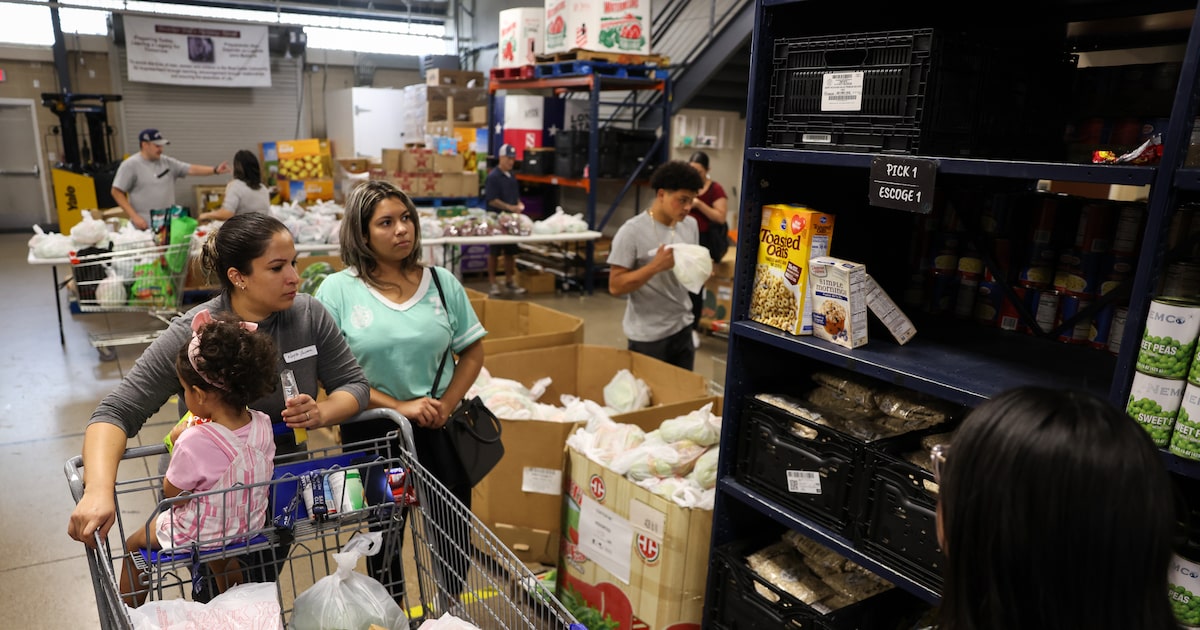Those experiencing food insecurity in southern Dallas and across North Texas are bracing for impact as anxieties grow over the federal government shutdown. If the shutdown continues past today, Texas has warned that November food assistance benefits may not be issued.
“It’s getting hard out here,” said Yolanda Lamb, a grandmother in Oak Cliff who said she’s relying on food assistance to care for her three grandsons. A loss of benefits would put her in a “struggle circle,” where she dips into money meant for bills to keep her family from going hungry.
Millions of Texans rely on SNAP, or the Supplemental Nutrition Assistance Program, informally known as food stamps, to make ends meet. In Dallas, community members, along with leaders of food banks and pantries, worry the loss of these benefits could be catastrophic for already struggling families and children as they head into the holiday season.
Lamb visits the Dallas Bethlehem Center in South Dallas, which has a pantry and serves hot meals two nights a week. Last week, visitors were panicking over what could happen if they lose benefits, said Annette Cullors, program manager at the center. They worry, she said, that there won’t be enough food at pantries if SNAP stops.
Breaking News
“Everybody was talking, ‘Did y’all hear about what’s going to happen? We’re not going to have any food. We don’t know what to do,’” Cullors said, adding, “It hurts my heart to know that there are children and senior citizens that may not have food.”
Leaders of pantries and food banks told The Dallas Morning News they’re committed to serving those in need but monitoring to see if benefits come through on time. Some said they’re already operating at full-tilt or seeing higher demand than during the pandemic. Others are getting requests from those anxious about future difficulties amid the shutdown.
“We’re talking epic numbers here,” said Wes Keyes, CEO of Brother Bill’s Helping Hand, of the demand already being seen. The nonprofit operates pantries in West and South Dallas. He added: The pantry has already served more people than it did last year. More food. More people. “Everything,” he said.
Related
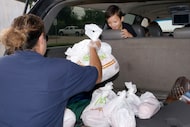
Food insecurity rates have trended upward since the pandemic. Texas has the highest rate of food insecurity in the U.S., according to nonprofit Feeding America. Rates are higher in Dallas County than at the national level. The southern half of the area experiences a larger share of insecurity, according to data presented earlier this year at Dallas City Hall, meaning residents face low incomes and less access to nutritious food.
Food providers brace for outcome
The scale of issues the North Texas region could face is significant, leaders said. The North Texas Food Bank, a major distributor for the area, has sent, on average, more than 10 million meals per month to agencies. The cost of living and inflation haven’t let up, said Clarissa Clarke, government relations officer for the food bank, who added that the NTFB’s partners are worried.
“Everybody is concerned because we’re hearing from our neighbors that they just can’t get by,” Clarke said. “They won’t be able to get by without the SNAP, and it’s a lot of working families.”
As the shutdown continues, several leaders said a delay in assistance could set those in need back, a domino effect for people already dealing with slim margins, or who have fallen on hard times, who may delay other bills to afford food.
Lamb, who is 67 and caring for children aged 12, 13 and 15, said she had a separate issue with her previous month’s food assistance, and is also relying on social security payments. She already hasn’t paid some bills. The shutdown doesn’t make sense to her. She has rent, water, gas, electric and a car note.
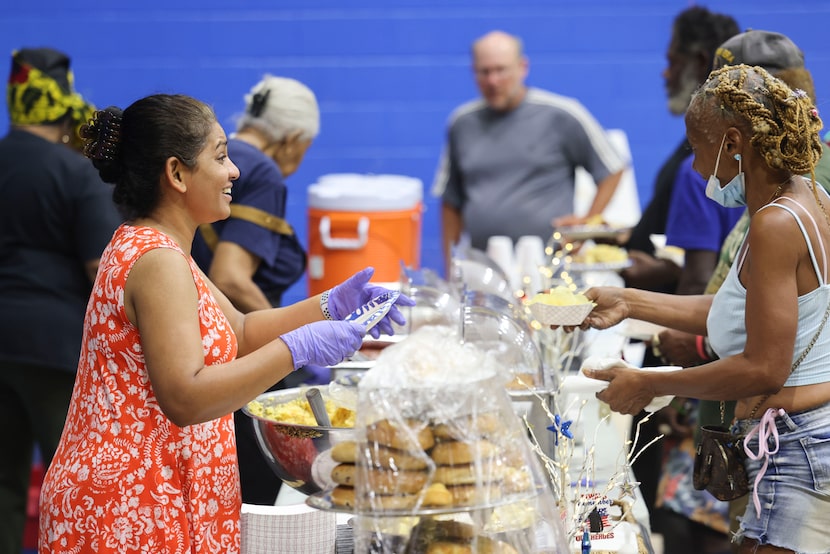
Staff Vera Isaac (left) serves as people walk in during a hot meal program at Dallas Bethlehem Center, on Wednesday, July 2, 2025.
Shafkat Anowar / Staff Photographer
It takes people a while to get back on their feet, said Benaye Wadkins Chambers, president of Crossroads Community Services, a food distributor that serves the Bethlehem Center.
“It’s not just, ‘the check doesn’t come this month,’” Wadkins Chambers said. “Even if I get it two weeks later or three weeks later, now I’m so far behind. I was behind before, and now I’m even farther behind.”
Crossroads has been seeing a steady increase of about 5% to 10% each week since the shutdown, she said, with the expectation of a big uptick if there’s no resolution this week. The possibility of SNAP not coming is happening as families head into the holidays, when there is typically elevated need, there could be layoffs and kids will be out of school, meaning they need more meals at home, she said.
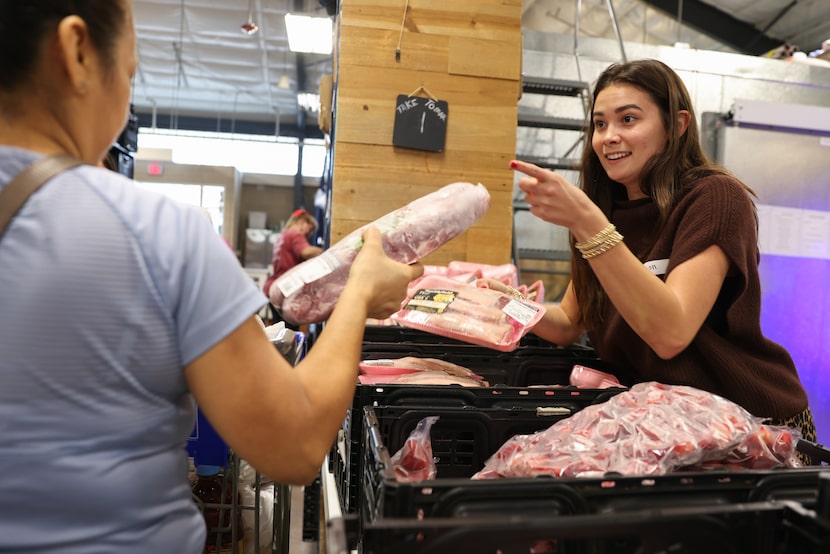
Dallas resident Madison Miller, 23, hands out pork products during Brother Bill’s Helping Hand grocery store hours on Thursday, Oct. 23, 2025, in Dallas. Miller said the service provides for those who may not have the opportunity to get groceries or health care otherwise.
Christine Vo / Staff Photographer
The NTFB estimates about 40,000 federal workers live in its service area, which stretches over about 9,200 miles and goes up to the Oklahoma border. Roughly 460,000 people on SNAP are estimated to live in the 12 counties the food bank serves.
Clarke said the NTFB ordered food from the U.S. Department of Agriculture in advance, meaning it will receive food through the end of the year. It receives 22% of its food from the USDA. It receives donations. However, it has been purchasing more food than it has in the past — 18% — and “we have to pay more, too,” Clarke said.
The cost of groceries increased 2.7% this August from one year ago, the largest gain outside the pandemic since 2015. In addition to the demand stretching food providers, they’ve already had to worry about federal funding cuts.
“Whatever we have to do to get the food out to our agency partners and to our neighbors, we are doing,” Clarke said.
Food insecurity doesn’t let up
At Brother Bill’s main location in West Dallas, cars spilled out of the parking lot and onto the road. The lobby was packed as neighbors snaked through the pantry with carts, picking out watermelons and other fruits or vegetables, canned and dried goods and frozen meats.
Keyes said the pantry is already overworked and understaffed, with workers departing for better-paying jobs. The pandemic was terrible, he said, but need has continued to snowball. Brother Bill’s has been around for more than 80 years, he said, through other emergencies. SNAP is the latest issue the pantry faces.
“I don’t know what that’s going to mean for us, but I can’t imagine it’s going to be good,” he said.
Brother Bill’s distributed 1.3 million meals in 2020, Keyes said. Last year, the organization doubled pandemic numbers. Keyes said that this year, they could be on track to triple the pandemic count. In 2025, through September, Brother Bill’s is already at more than 2.6 million meals.
At the Jubilee Park and Community Center, a much smaller food operation, there has been about a 3% increase, already serving more families this year than last year, said Mark Mullaney, the chief operating officer.
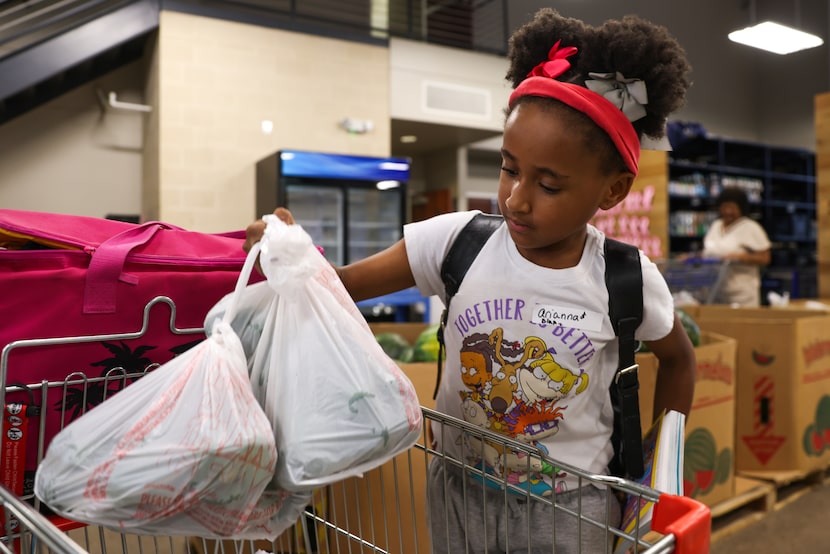
Dallas resident Blake Mason, 8, puts bagged green bell peppers into the cart during Brother Bill’s Helping Hand grocery store hours on Thursday, Oct. 23, 2025, in Dallas. Mason’s mother said it is important to accept any help you can get, especially during these times.
Christine Vo / Staff Photographer
Over the past few weeks, families have been reaching out about availability, he said, but there’s a waitlist. Organizations are open fewer days leading up to the holidays, and demand is usually higher.
“We’ve just seen increased phone calls and inquiries with people thinking about if these benefits are affected, how they’ll continue to try to make ends meet and stretch their food resources further,” Mullaney said.
With the waitlist, if someone doesn’t show, Jubilee tries to make calls in real-time to backfill scheduled pickups, he said. The center is also keeping up with other organizations to refer visitors. Mullaney said the center also provides rental, mortgage and utility assistance, which could help offset costs and help food budgets.
“If this is affected on that large of a scale, it’s going to be hard to absorb all of that additional demand and need because our folks are already just trying to make it work every month,” he said.
Community could step up
Clarke, with the NTFB, noted that government workers and others seeking SNAP can still sign up. There may be a delay in the benefit, but at least their application will be in and they’ll be directed to resources in the meantime, she said.
Food providers said those looking to help can donate or reach out to their local organizations and volunteer. Additionally, the community can check to see which items are needed and organize a drive.
Like several others, Keyes said Brother Bill’s will double-up its efforts, and he believes and hopes that donors, churches, businesses or volunteers will come through for those in need.
“We’re going to be here,” Keyes said. “We’re always going to be here. That’s what Christ has called us to do, is to be here during hard times for people.”
At the Bethlehem Center, volunteers are already calling to ask if there’s a way to help or make donations as uncertainty continues, Cullors said. Cullors said she’s not worried about being busy. There have been times when she, and others, have pulled from their own pockets to ensure food was available.
“My heart aches more than I am worried about it,” Cullors said. ”I just hurt to see that it’s happening and to see that we are a country that is at that point where people may not be able to get food.”
Lamb, who has been working to feed her grandkids, said the community can’t wait for the government to reopen. She believes life could become more difficult, so it’s important for the community to help.
When she picks up groceries at the Bethlehem Center or other places, she takes them to seniors or parents in her neighborhood. She uses her transportation to give back.
“I might not have much. I ain’t no millionaire,” Lamb said, but when she sees food others don’t want, she takes it to those who need it “because everybody’s got to eat.”
This reporting is part of the Future of North Texas, a community-funded journalism initiative supported by the Commit Partnership, Communities Foundation of Texas, The Dallas Foundation, the Dallas Mavericks, the Dallas Regional Chamber, Deedie Rose, Lisa and Charles Siegel, the McCune-Losinger Family Fund, The Meadows Foundation, the Perot Foundation, the United Way of Metropolitan Dallas and the University of Texas at Dallas. The News retains full editorial control of this coverage.
